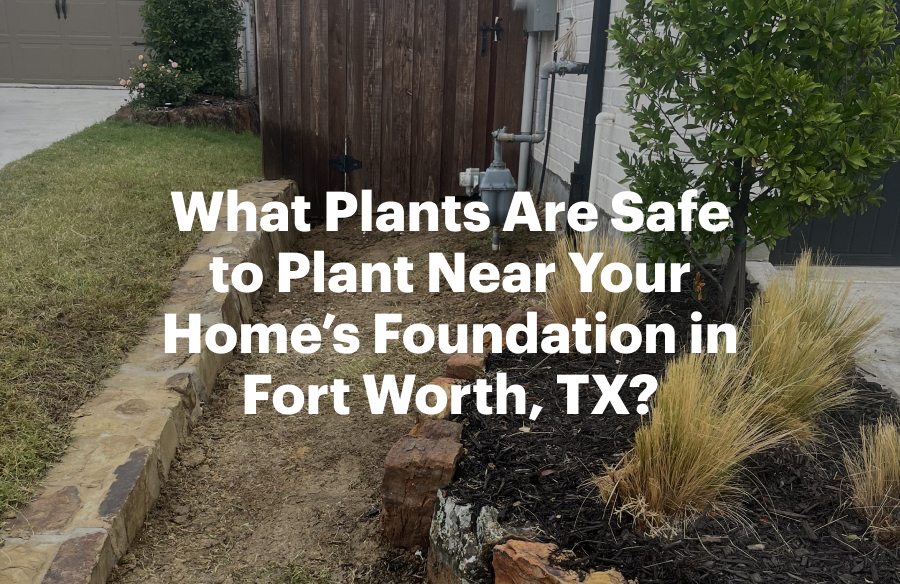In Fort Worth, Texas, homeowners must know the right plants they can add to their front yard. Without knowing, it could cause problems because of Fort Worth clay soil’s expanding properties, which are activated by precipitation, can cause foundation movement. Additionally, not correctly planting can cause soil moisture imbalances and shifting, which lead to foundation shifting. However, with smart plant selection and proper care, you can enjoy a beautiful landscape that coexists with your home’s foundation. In this blog, we’ll share our advice on what plants are safe to plant near your Fort Worth, Texas foundation and which ones to avoid.
Why Plant Choice Matters for Foundation Health
Fort Worth and Dallas, TX soil is mainly clay-based, meaning it expands when wet and contracts during the dry season. This movement places pressure on a home’s foundation and is a leading cause of foundation damage. Plants that require a lot of water or have root systems worsen these issues by creating inconsistent moisture in the soil around your home’s foundation or lifting it with its roots.
Favorable Foundation-Friendly Plant Types
The safest plant types to plant near your foundation typically have shallow root systems that won’t spread aggressively to unwanted areas or won’t dig down deeply. They also have low water requirements. This helps reduce moisture fluctuations in the soil that can cause your home’s foundation to shift. This plant usually grows in compact forms, which minimizes the risk of taking all the moisture from your home. To prevent the risk of damaging your foundation, you must have constant moist soil all year round. That’s why you mustn’t have a plant that needs a lot of water. Choosing native or non-water-demanding plants makes it easier to maintain your foundation and adjust it to the weather in Fort Worth.
Best Types of Plants for Fort Worth Foundations
Low-growing shrubs are excellent options because they maintain near-surface-level roots and don’t need deep watering. Another popular option is Ornamental grasses. They have fibrous roots that provide stability to the soil without causing issues to your foundation. Clumping ground covers give erosion control benefits by binding the soil together while growing in a controllable way. Flowering perennials are perfect for the climate as they give your lawn a splash of color while requiring minimal irrigation. Xeriscape-compatible plants are perceived as some of the best choices for yard plans. They are designed to survive in low-water landscapes, making them ideal for the soil near your home.
Plant Types to Avoid Near Foundations
Certain plants should be avoided due to their potential to cause damage to your home’s foundation. Do not plan any large shade trees that are known to be fast-growing. Their aggressively growing roots can extend under the foundation or driveway and cause significant damage. Another plant that should never be planted is bamboo; they are notorious for spreading forcefully and damaging nearby structures and other plant ecosystems. They are an invasive species of plant that become a nightmare to remove. Shrubs that need frequent watering can make the soil very dry, and when a rainy day comes in, it can lead to the expansion and contraction of the clay-rich Fort Worth soil.
Smart Planting Practices
Even with safe plants near your foundation, it’s essential to always plan out what type of plants you want in your front yard. Always maintain a safe distance between plants and your foundation. There should be at least three to five feet of clearance. This buffer helps prevent roots from causing damage and prevents them from taking all the moisture near the base of your home. Try out to use mulch to help regulate soil moisture and temperature. You want to regularly water the soil around your home so it never dries out. Additionally, remember to inspect the grading on your home so as not to have a water pool near the base of your foundation.
Maestro’s Foundation Repair
Protecting your Fort Worth, TX, foundation starts with the right landscaping choices. By selecting plant types that require minimal water, have limited root systems, and are meant for local soil and weather conditions, you can enjoy a beautiful landscape without the stress of affecting your foundation. If you’re noticing signs of damage to your home’s foundation, contact Maestro’s Foundation Repair for professional pier and beam and slab-on-grade foundation repair. Call Maestro’s Foundation Repair today to schedule a free consultation and protect your home from foundation issues caused by improper planting.
